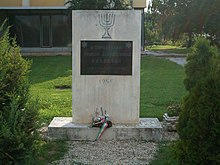Kunmadaras pogrom

The Kunmadaras pogrom was an anti-Semitic pogrom that took place shortly after the Second World War in Kunmadaras, Hungary.
The pogrom took place on 22 May 1946. According to the Jewish Telegraphic Agency, four Jews were killed.[1]
The riot began in the marketplace as a spontaneous protest against a suspected profiteer. Since the traditional occupation of the Jews in the area was trade, the image of a profiteer was conflated with that of a Jew. Thus the riot grew into an anti-Jewish pogrom. The frenzy was further instigated by the rumors that the Jews were stealing Christian children. The historian made a peculiar observation about the subsequent trial of the pogromists: "The People's Tribunal managed to produce a narrative of an anti-Semitic pogrom without involving the Jewish victims." The pogrom was portrayed as a resurgence of fascism pitched against the nascent people's democracy.[2]
Nine rioters were convicted on 26 July 1946 of having instigated and participated in the violence, with sentences ranging from the death penalty for three of those convicted, to six years imprisonment.[3]
See also[]
References[]
- ^ "Report of Miskolc Outbreak Says Fascist Mob Utilized Workers Protest Against Profiteers". Jewish Telegraphic Agency. 5 August 1946.
- ^ Apor, Péter (2013). "The Lost Deportations and the Lost People of Kunmadaras: A Pogrom in Hungary, 1946". Hungarian Historical Review. 2 (3): 566–604.
- ^ Kamins, Toni (17 November 1946). "Nine Convicted of Participation in Kunmadaras Pogrom Appeal to Higher Court". Jewish Telegraphic Agency. Retrieved 2020-01-06.
- Hidas, Peter I. "Canada and the Hungarian Jewish Refugees 1956-1957". John Carroll University, AHEA Conference, 9-11 April 1999. Sympatico.
Further reading[]
- Braham, Randolph L; Chamberlin, Brewster S (2004). Holocaust in Hungary: Sixty Years Later. Rosenthal Institute for Holocaust Studies, Graduate Center of the City University of New York. pp. 167, 189. ISBN 0-88033-576-9.
- Anti-Jewish violence in Central and Eastern Europe, 1944–1946
- Blood libel
- Antisemitism in Hungary
- Jewish Hungarian history
- Massacres in Hungary
- May 1946 events
- 1946 riots
- 1940s murders in Hungary
- 1946 crimes in Hungary
- 1946 murders in Europe
- 1946 in Judaism
- Hungarian history stubs
- Jewish history stubs